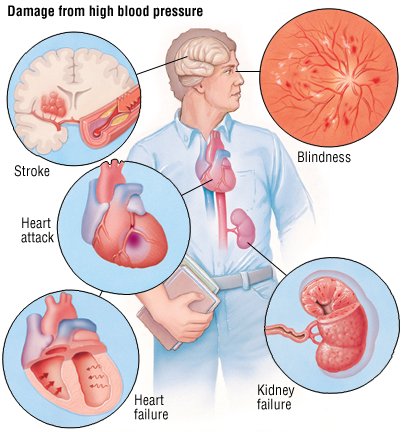Blood pressure has two components:
- Systolic pressure is the top number. It represents the pressure the heart generates when it beats to pump blood to the rest of the body.
- Diastolic pressure is the bottom number. It refers to the pressure in the blood vessels between heartbeats.
Blood pressure is measured in millimeters of mercury (mmHg). So blood pressure would be expressed, for example, as 120/80 mmHg.
High blood pressure is diagnosed when one or both of these numbers is too high. High blood pressure is also called hypertension.
Blood pressure is categorized as follows:
Normal: Less than 120/80 mmHg
Prehypertension: 120/80 to 139/89 mmHg
Stage 1 hypertension: 140/90 to 159/99 mmHg
Stage 2 hypertension: 160/100 mmHg and above
Usually, systolic pressure increases as we age. However, after age 60, diastolic pressure usually begins to decline.
Prehypertension is not a disease—yet. But it does mean you are at increased risk for developing high blood pressure.
Although high blood pressure can cause symptoms such as headache and pounding heartbeat, it often causes no symptoms at all.
So why worry about high blood pressure? Because even when high blood pressure is not causing any symptoms, it can silently damage many organs, including the:
- Brain
- Eyes
- Heart
- Kidneys
- Arteries throughout the body
You may not recognize the damage that silent hypertension has been doing to your body until you suddenly are stricken with a major disease. For example, hypertension increases your risk of heart attack, stroke, and kidney failure.
 |
Symptoms
Usually, hypertension does not directly cause symptoms. When blood pressure is very high, it can cause:
- Headaches
- Dizziness
- Fatigue
- Ringing in the ears
Diagnosis
The diagnosis of hypertension depends on blood pressure readings. Therefore, it's essential that blood pressure be measured carefully.
To obtain an accurate blood pressure measurement:
- Avoid the following for at least one hour before you have your blood pressure taken:
- Strenuous exercise
- Smoking
- Eating
- Drinking caffeinated beverages
- Be seated for at least five minutes before the reading is taken.
- Do not talk while your blood pressure is being measured.
- Two readings should be recorded and averaged.
If your blood pressure is high, your doctor should examine your eyes, heart and nervous system, to look for evidence of damage from hypertension.
If there is no such evidence, you should return for at least two more blood pressure measurements. Only then should the doctor diagnose you with hypertension. That is because a single high reading can happen to anyone.
Once you are diagnosed with hypertension, other tests will check for organ damage. These tests can include:
- Blood tests to check kidney function
- An electrocardiogram (EKG) to look for:
- Thickening of the heart muscle
- Reduced blood flow to your heart
- Irregular heart rhythms
Prevention
To prevent high blood pressure:
- Get regular aerobic exercise
- Limit your intake of salt and alcoholic beverages
- Eat a diet rich in fruits and vegetables and low in saturated fats
- Avoid smoking
- Maintain a desirable body weight
Hypertension increases your risk of heart attack and stroke. So it is important to modify your risk factors for coronary artery disease. In addition to the above actions, you should:
- Quit smoking
- Reduce your high LDL (bad) cholesterol
You may be able to cure your hypertension with lifestyle changes alone.
Treatment
Sometimes lifestyle changes cannot adequately control hypertension. If this is the case, medication will be needed.
Antihypertensive medications include:
- Diuretics
- Beta-blockers
- ACE inhibitors
- Angiotensin receptor blockers
- Calcium channel blockers
- Alpha-blockers
People with diabetes, kidney disease or heart problems are at higher risk of complications from hypertension. As a result, they are usually treated more aggressively with medications.
When To Call A Professional
Adults should have their blood pressure measured at least every few years.
If your blood pressure is higher than 120/80 mmHg, schedule regular appointments with your doctor. Have your blood pressure monitored more regularly. And get advice about modifying your lifestyle to prevent future problems.
Prognosis
The prognosis for hypertension depends on:
- How long you've had it
- How severe it is
- If you have other conditions (such as diabetes) that increase the risk of complications
Hypertension can lead to a poor prognosis even if you do not have symptoms.
When high blood pressure is treated adequately, the prognosis is much better. Both lifestyle changes and medicines can control your blood pressure.



.jpg)
.jpg)
